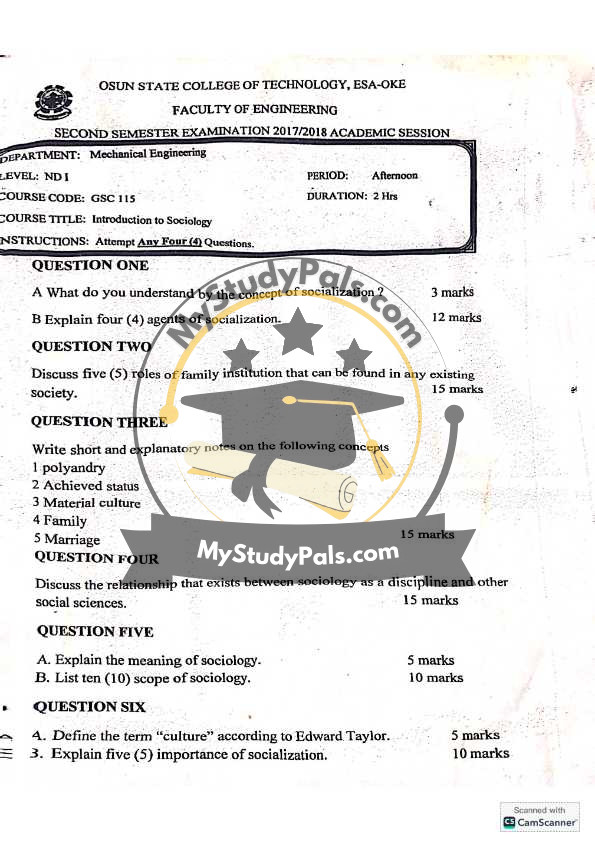ANSWER
Question 1:
A. What do you understand by the concept of socialization?
Socialization is the process through which individuals learn and internalize the norms, values, behaviors, and cultural practices of their society. It enables people to function as members of a group and shapes their identity and social roles.
B. Explain four (4) agents of socialization.
- Family – The first and most influential agent; it teaches basic values, norms, and behaviors.
- Peers – Friends and social groups influence habits, language, and interests.
- Education – Schools impart knowledge, discipline, and cultural values.
- Mass Media – Television, social media, and books provide information and shape perceptions.
Question 2:
Discuss five (5) roles of the family institution that can be found in any existing society.
- Socialization – The family teaches children societal norms, values, and customs.
- Emotional Support – Provides love, care, and security to its members.
- Economic Support – Meets the financial and material needs of family members.
- Reproduction – Ensures the continuity of society through childbearing.
- Social Status – Determines the social class and cultural identity of individuals.
Question 3:
Write short and explanatory notes on the following concepts:
- Polyandry – A form of marriage where one woman has multiple husbands. It is less common and exists in societies like Tibet.
- Achieved Status – A social position attained based on personal effort, skills, or achievements, such as becoming a doctor or an athlete.
- Material Culture – Physical objects and artifacts created by society, such as buildings, tools, and technology.
- Family – A social institution consisting of individuals related by blood, marriage, or adoption, providing support and structure to its members.
- Marriage – A legally or socially recognized union between individuals, often involving mutual rights and obligations.
Question 4:
Discuss the relationship that exists between sociology as a discipline and other social sciences.
Sociology is closely related to other social sciences:
- Anthropology – Both study human societies, but anthropology focuses more on cultural and historical aspects.
- Psychology – Sociology examines group behavior, while psychology focuses on individual mental processes.
- Political Science – Sociology studies social structures that influence political behavior and institutions.
- Economics – Sociology analyzes how social factors impact economic activities and wealth distribution.
- History – Both disciplines examine past events, but sociology uses history to understand social trends and patterns.
Question 5:
A. Explain the meaning of sociology.
Sociology is the scientific study of human society, social behavior, and interactions. It examines institutions, cultural norms, and group dynamics to understand how societies function and evolve.
B. List ten (10) scopes of sociology.
- Social institutions
- Social change
- Culture and norms
- Social stratification
- Family and kinship
- Crime and deviance
- Education system
- Political systems
- Economic structures
- Human interactions
Question 6:
A. Define the term “culture” according to Edward Taylor.
Edward Taylor defines culture as “that complex whole which includes knowledge, belief, art, morals, law, custom, and any other capabilities and habits acquired by man as a member of society.”
B. Explain five (5) importance of socialization.
- Personality Development – Helps individuals form their identity and character.
- Cultural Transmission – Passes down traditions, beliefs, and practices.
- Social Integration – Enables individuals to fit into society and develop relationships.
- Behavior Regulation – Teaches appropriate behavior and societal expectations.
- Role Preparation – Prepares individuals for future roles, such as work and family responsibilities.


